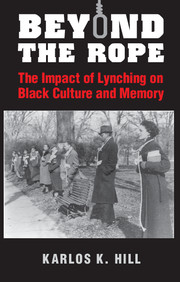Beyond the Rope: A New Book on The Impact of Lynching on Black Culture and Memory
This post is part of a new and recurring blog series I am editing–announcing the publication of selected new books in African American and African Diaspora History. Several weeks ago, Cambridge University Press published a new book entitled Beyond the Rope: The Impact of Lynching on Black Culture and Memory.
***
 The author of Beyond the Rope is Karlos K. Hill. Professor Hill is an associate Professor of African and African American Studies at the University of Oklahoma and Founding Director of the Distinguished African American History Month Lecture Series at the university. Professor Hill specializes in the history of lynching and the antilynching movement in America. His core research aim is to uncover the various ways in which racial violence has been central to the black experience in America. Additionally, Professor Hill’s research explores how black Americans have resisted racial violence and how black resistance has changed over time. Professor Hill is a frequent commentator on issues of race, equity, and social justice. He has been quoted in the USA Today, Newswise, the Dallas Morning News, Texas Public Radio, and numerous other local and regional news outlets. His weekly podcast, “Tapestry: A Conversation About Race and Culture,” has a global following. Follow Professor Hill on Twitter @thinking4achang.
The author of Beyond the Rope is Karlos K. Hill. Professor Hill is an associate Professor of African and African American Studies at the University of Oklahoma and Founding Director of the Distinguished African American History Month Lecture Series at the university. Professor Hill specializes in the history of lynching and the antilynching movement in America. His core research aim is to uncover the various ways in which racial violence has been central to the black experience in America. Additionally, Professor Hill’s research explores how black Americans have resisted racial violence and how black resistance has changed over time. Professor Hill is a frequent commentator on issues of race, equity, and social justice. He has been quoted in the USA Today, Newswise, the Dallas Morning News, Texas Public Radio, and numerous other local and regional news outlets. His weekly podcast, “Tapestry: A Conversation About Race and Culture,” has a global following. Follow Professor Hill on Twitter @thinking4achang.

Beyond the Rope is an interdisciplinary study that draws on narrative theory and cultural studies methodologies to trace African Americans’ changing attitudes and relationships to lynching over the twentieth century. Whereas African Americans are typically framed as victims of white lynch mob violence in both scholarly and public discourses, Karlos K. Hill reveals that in the late nineteenth and early twentieth centuries African Americans lynched other African Americans in response to alleged criminality, and that twentieth-century black writers envisaged African American lynch victims as exemplars of heroic manhood. By illuminating the submerged histories of black vigilantism and consolidating narratives of lynching in African American literature that framed black victims of white lynch mob violence as heroic, Hill argues that rather than being static and one dimensional, African American attitudes towards lynching and the lynched black evolved in response to changing social and political contexts.
In Beyond the Rope: The Impact of Lynching on Black Culture and Memory, Karlos K. Hill powerfully contributes to the movement among historians to reconstruct counter narratives of lynchings told from the perspective of [a] variety of African American actors pursuing very different goals. Perhaps better than has been done before, Hill has historicized African American counter narratives of lynching, situating them within their sociohistorical context and drawing out their specific political objects.” —Sundiata Keita Cha-Jua, University of Illinois, Urbana-Champaign
***
